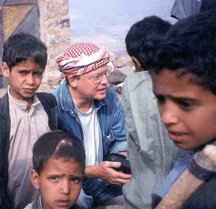Every day in the Middle Eastern country of Yemen, battles are being waged that don’t involve bombs, guns or even a raised fist. Rather in Yemen, where physical violence is considered an inferior form of honor-conflict, poetry is one of the preferred weapons of choice.
So says Steven C. Caton, professor of social anthropology and director of the Center for Middle Eastern Studies at Harvard University.
Caton—who has written that this form of symbolic violence actually makes physical violence less likely—will discuss the significance of poetry in the Middle East beginning at 3:30 p.m. March 9 at NAU’s Cline Library Assembly Hall. The lecture is free and open to the public.
According to Jim Wilce, NAU professor of anthropology, Caton’s lecture will offer a greater understanding of conflict and its day-to-day mediation in the Middle East, and said it might impact how we look at current world issues.
“Caton himself can stand up on the spur of the moment and improvise Arabic poetry like his life or honor depended on it,” Wilce said. “The skills of poetic improvisation are intimately related to Islamic piety in Yemen. What would understanding such things do to our perceptions of the Middle East and various conflicts there?”
Caton is the author of Peaks of Yemen I Summon: Poetry as Cultural Practice in a North Yemeni Tribe, Yemen Chronicle and Lawrence of Arabia: A Film’s Anthropology. His is the sixth lecture in the series Language Across the Univers(ity).
For information, call (928) 523-2729 or e-mail Jim.Wilce@nau.edu.



